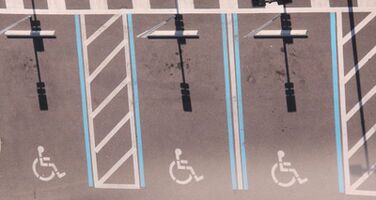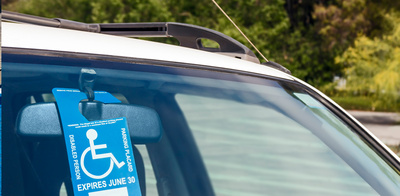
Discover the Benefits of Having a Handicap Placard in Colorado
Living with a disability can present a wide range of challenges, but thanks to disability parking tags, many individuals with mobility impairments can enjoy greater independence and convenience. In CO, disability tags offer numerous benefits that make daily tasks, travel, and access to public facilities easier for people with disabilities. From designated parking spaces to exemptions from certain parking rules, these tags provide essential accommodations for those who need them most.
In this comprehensive guide, we’ll explore the many benefits of having a handicap placard in Colorado, walk through the process of applying for one, and provide practical tips for maximizing its advantages. Whether you’re a resident or visitor to CO, understanding the benefits of a disability tag can significantly improve your quality of life.
What is a Handicap Placard in Colorado?
Definition and Purpose
A disability tag in CO, also known as a placard or permit, is a special parking authorization issued by the Colorado Department of Revenue to individuals with qualifying disabilities. The primary purpose of a disability tag is to provide accessible parking options for people with mobility impairments or other disabilities that affect their ability to walk long distances. Disability tags allow individuals to park in designated accessible spaces, which are often located closer to building entrances and feature additional space for loading and unloading mobility aids such as wheelchairs or walkers.
Disability tags come in two main forms in CO:
- Placards that are hung from the rearview mirror of a vehicle.
- License plates that replace the standard vehicle plate and indicate that the vehicle is authorized to use disability parking spaces.
Both tags and license plates serve the same function, allowing the vehicle to park in spaces reserved for individuals with disabilities.
Types of Disability Tags Available in Colorado
CO offers several types of handicap permits to accommodate the needs of different individuals:
- Permanent Disability Tag/License Plate: Issued to individuals with long-term or permanent disabilities. These tags are typically valid for up to three years and must be renewed periodically.
- Temporary Disability Tag: Available for individuals with temporary disabilities, such as those recovering from surgery or injury. Temporary tags are valid for up to 90 days but can be extended if necessary.
- Disabled Veteran License Plate: Reserved for veterans with service-connected disabilities. This plate not only provides accessible parking privileges but also honors the individual’s military service.
Who Qualifies for a Handicap Placard in Colorado?
Physical Disabilities and Medical Conditions
To qualify for a Colorado disabled permit, individuals must have a medical condition that significantly limits their mobility or makes it difficult to walk long distances. According to CO law, the following conditions typically qualify:
- Inability to walk more than 200 feet without stopping to rest.
- Severe lung disease or respiratory conditions that limit physical exertion.
- Cardiac conditions that are classified as Class III or Class IV by the American Heart Association.
- Dependence on portable oxygen.
- Arthritic, neurological, or orthopedic conditions that significantly impair mobility.
- Amputation of limbs or the use of a wheelchair, cane, crutches, walker, or other mobility aids.
These conditions must be verified by a licensed healthcare provider, who will certify that the individual meets the criteria for a disability tag.
Temporary Disabilities and Injury Recovery
CO also offers temporary disability tags for individuals who have short-term disabilities or are recovering from injuries that affect their mobility. Common qualifying conditions for a temporary tag include:
- Post-surgical recovery from procedures such as joint replacements or spinal surgeries.
- Broken bones or injuries that make walking difficult.
- Temporary mobility impairments resulting from accidents or illnesses.
Temporary disability tags are usually valid for up to 90 days but can be renewed if the condition persists beyond the expected recovery period.
Special Considerations for Veterans
Veterans with service-related disabilities may be eligible for a Disabled Veteran License Plate, which provides the same parking privileges as other disability tags while honoring their military service. To qualify, veterans must provide documentation from the U.S. Department of Veterans Affairs (VA) that confirms their service-connected disability.
How to Apply for a Handicap Placard in Colorado
Step-by-Step Application Process
Applying for a disability tag in CO is a relatively straightforward process. Here’s how it works:
- Obtain the Application Form: You can download the application form (Form DR 2219) from the CO Department of Revenue website or pick up a copy from your local motor vehicle office.
- Complete the Form: Fill out the applicant information section of the form, including your name, address, and contact details.
- Medical Certification: Take the form to your healthcare provider (a licensed physician, physician assistant, advanced practice nurse, or podiatrist), who will complete the medical certification section. This certification verifies that you meet the eligibility criteria for a disability tag.
- Submit the Application: You can submit the completed form by mail or in person at your local motor vehicle office. Be sure to include any required documentation, such as proof of identity and vehicle registration if applying for a license plate.
- Receive Your Tag: Once your application is processed, your disability tag or license plate will be issued, either by mail or for pickup at the motor vehicle office.
Required Documentation
When applying for a disability tag in CO, you’ll need the following:
- A completed application form (Form DR 2219).
- Medical certification from a licensed healthcare provider.
- Proof of identity (such as a driver’s license or state ID).
- Vehicle registration information if applying for a disability license plate.
Fees and Costs Involved
In CO, there is no fee for applying for a permanent or temporary disability tag. However, if you are applying for a Disabled Veteran License Plate, you may need to pay a small fee for the license plate itself, depending on the type of vehicle and plate requested. Standard vehicle registration fees apply to vehicles using a disability license plate.
Benefits of Having a Handicap Placard in Colorado
Access to Designated Parking Spaces
One of the most obvious and significant benefits of having a disability tag in CO is access to designated disabled parking spaces. These accessible spaces are typically located closer to building entrances, reducing the distance that individuals with mobility impairments must walk. They are also wider than regular spaces, providing extra room for individuals using wheelchairs, walkers, or other mobility aids to safely enter and exit their vehicles.
Accessible parking spaces are available at a variety of locations, including:
- Grocery stores and shopping centers.
- Medical facilities and hospitals.
- Government buildings.
- Schools, universities, and other educational institutions.
- Parks, recreation areas, and tourist attractions.
By providing easier access to parking, disability tags make it more convenient for individuals with disabilities to complete daily tasks and participate in community activities.
Exemption from Metered Parking and Time Limits
In many CO cities and towns, disability tag holders are exempt from paying parking meter fees and can park in metered spaces without the need to constantly feed the meter. This benefit is especially helpful in urban areas where metered parking is common. Additionally, some cities may allow individuals with disability tags to park in time-limited spaces for longer periods, though this varies by location.
It’s important to check local parking regulations, as not all cities in CO provide meter exemptions, and time limits may still apply in certain areas.
Improved Accessibility at Public Facilities
Having a disability tag not only grants access to parking spaces but also improves accessibility at public facilities. Many businesses, government offices, and public buildings in CO are required to provide accessible entrances, ramps, and restrooms. With a disability tag, individuals with disabilities can more easily access these buildings and take advantage of services without encountering physical barriers.
Public transportation hubs, such as bus and train stations, also provide designated parking spaces for individuals with disabilities, ensuring that they can use public transit with greater ease.
Convenience for Caregivers and Family Members
A disability tag can also be a significant benefit for caregivers and family members who transport individuals with disabilities. As long as the person to whom the disability tag was issued is in the vehicle, caregivers can use the tag to park in accessible spaces, making it easier to assist individuals with mobility impairments when running errands or attending appointments.
However, it’s important to remember that caregivers cannot use the disability tag when the person it was issued to is not present in the vehicle. Misuse of the tag can result in fines and penalties.
Using Your Disabled Permit in Other States
Traveling with Your Disability Tag
Disability tags issued in CO are recognized in other states under the Americans with Disabilities Act (ADA). This means that you can use your CO-issued disability tag or license plate to park in designated accessible spaces while traveling across the United States. However, parking regulations (such as metered parking exemptions and time limits) may vary from state to state, so it’s important to familiarize yourself with local parking rules when visiting a new area.
Reciprocity with Other States
The ADA ensures that all U.S. states recognize handicap placards from other states. This reciprocity means that individuals traveling from CO to another state can still take advantage of accessible parking spaces, as long as their disability tag is properly displayed.
It’s also worth noting that some Canadian provinces and European countries honor U.S.-issued disability tags. If you’re traveling internationally, it’s a good idea to research the specific regulations in the country you plan to visit to confirm whether your CO tag will be recognized.
Renewing and Replacing a Disabled Permit
How to Renew Your Disability Tag
In CO, permanent disability tags are valid for up to three years, while temporary tags are typically valid for 90 days. To renew a permanent disability tag, you must submit a renewal application to the CO Department of Revenue before your tag’s expiration date. You may also need to provide updated medical certification if your condition has changed.
Temporary tags can be extended if your temporary disability persists beyond the initial 90-day period, but this requires a new application and updated medical certification.
What to Do if Your Tag is Lost or Stolen
If your disability tag or license plate is lost, stolen, or damaged, you can request a replacement by submitting a new application form to the CO Department of Revenue. Be sure to provide a signed statement explaining the circumstances of the loss or theft. There may be a small fee for replacing a lost or stolen tag, but fees are typically waived for permanent disability tags.
Common Misconceptions About Disabled Permits
Myth: Disability Tags are Only for Wheelchair Users
One of the most common misconceptions about disability tags is that they are only for individuals who use wheelchairs. In reality, disability tags are available to people with a wide range of mobility impairments and medical conditions. Qualifying conditions include heart and lung diseases, neurological disorders, arthritis, and more. The key factor is whether the condition affects the person’s ability to walk or move safely in public spaces.
Myth: Disability Tags Give Unlimited Parking Privileges
Another common myth is that having a disability tag allows individuals to park anywhere, including no-parking zones, loading zones, or fire lanes. In fact, disability tags only provide access to designated accessible parking spaces and certain parking meter exemptions. Disability tag holders must still adhere to parking regulations, including time limits and restrictions on where they can park.
Myth: Anyone Can Use a Disability Tag
A third misconception is that family members or friends can use a disability tag even when the person it was issued to is not in the vehicle. This is illegal. Disability tags are issued to specific individuals based on their medical conditions, and they are only valid when the person to whom the tag was issued is present in the vehicle. Misusing a disability tag can result in fines, penalties, and even the revocation of the tag.
How to Maximize the Benefits of Your Disabled Permit
Planning Ahead for Busy Areas
If you’re visiting a busy area, such as a shopping center or downtown district, plan ahead to ensure you can find accessible parking. Many businesses offer online information about parking options, and some cities have mobile apps that allow you to locate available parking spaces. Arriving early can also help you secure a spot in high-traffic areas.
Avoiding Common Misuse Pitfalls
To avoid penalties and ensure that your disability tag is used correctly, follow these tips:
- Always display your tag properly: Hang it from the rearview mirror when parked in an accessible space and remove it when driving.
- Do not lend your tag to others: Only the person to whom the tag was issued can use it.
- Renew your tag on time: Keep track of your tag’s expiration date and submit your renewal application before it expires.
Advocating for Accessibility Improvements
If you notice that a business or public facility lacks adequate accessible parking or has barriers that make it difficult for individuals with disabilities to access services, consider advocating for improvements. You can contact local authorities, business owners, or disability rights organizations to report the issue and suggest ways to make the space more inclusive.
Frequently Asked Questions (FAQs)
What types of disabilities qualify for a disability tag in CO?
A variety of conditions qualify for a disability tag in CO, including but not limited to:
- Inability to walk more than 200 feet without stopping to rest.
- Severe lung or heart conditions.
- Dependence on portable oxygen.
- Use of a wheelchair, walker, or other mobility aids.
- Neurological disorders, arthritis, and other conditions that impair mobility.
How long does it take to get a disability tag?
The processing time for a disability tag in CO is typically 7 to 10 business days after submitting your application. You can apply by mail or in person at a local motor vehicle office.
Can I use my CO disability tag in other states?
Yes, disability tags issued in CO are recognized in other states under the Americans with Disabilities Act (ADA). However, parking regulations (such as meter exemptions) may vary, so check local rules when traveling.
What should I do if someone is misusing a disability parking space?
If you witness someone misusing a disability parking space, you can report the violation to local law enforcement or parking enforcement. Be prepared to provide details such as the vehicle’s license plate number, make/model, and the location of the violation.
How much does it cost to apply for or renew a disability tag in CO?
There is no fee for applying for or renewing a permanent or temporary disability tag in Colorado. However, standard vehicle registration fees apply if you are applying for a disability license plate.
Can a caregiver use my disability tag when I'm not in the vehicle?
No, it is illegal for a caregiver or family member to use your disability tag if you are not in the vehicle. The tag is only valid when the person to whom it was issued is present.
Conclusion
Having a handicap placard in Colorado provides a wealth of benefits that can make daily life easier for individuals with mobility impairments or other qualifying disabilities. From access to designated parking spaces to exemptions from metered parking and improved accessibility at public facilities, these tags are an essential tool for promoting independence and inclusion.
By understanding the eligibility criteria, application process, and proper use of disability tags, you can take full advantage of the accommodations that CO offers to its residents and visitors with disabilities. Whether you’re running errands, attending appointments, or exploring the state’s natural beauty, a disability tag ensures that you have the access you need to navigate public spaces with ease and dignity.
.png)






